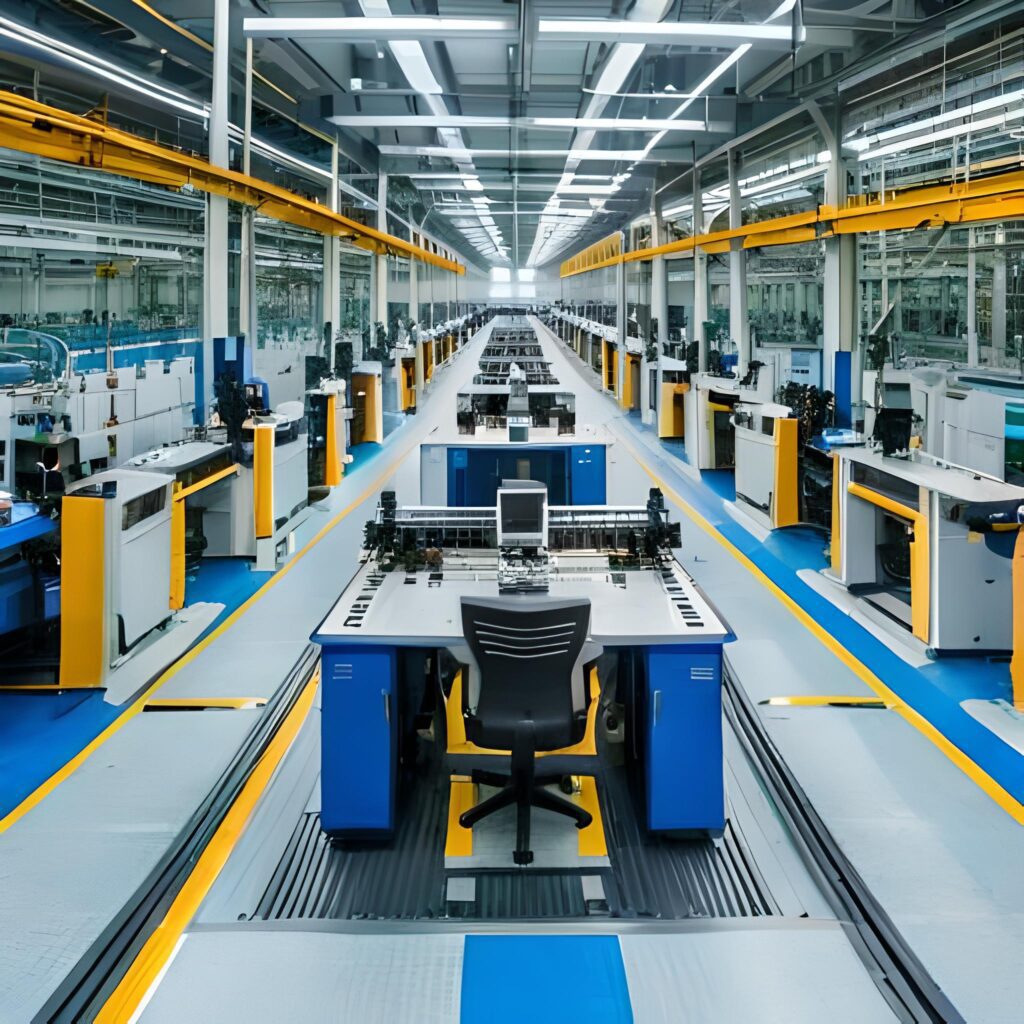
Introduction Types of Industries
Table of Contents
Types of Industries In today’s global economy, industries play a vital role in shaping the world we live in. They are the backbone of economic development, job creation, and technological advancements. Understanding the different types of industries is essential for anyone seeking insights into the diverse sectors that drive our modern society. This article provides a comprehensive overview of various industries, highlighting their characteristics, significance, and key examples.
Manufacturing industries encompass a broad spectrum of sectors involved in the production and fabrication of goods. These industries employ various technologies, processes, and skilled labor to transform raw materials into finished products. Let’s now dive into some of the most significant types of manufacturing industries in detail.
- Types of Industries
- Manufacturing Industry: Types of Industries in the manufacturing industry is responsible for producing tangible goods through various processes and technologies. It involves taking raw materials and transforming them into finished products that consumers can purchase. Examples of sectors within the manufacturing industry include automobile manufacturing, electronics, textiles, and food processing.
- Service Industry: The service industry focuses on providing intangible services to customers. Instead of producing physical goods, businesses in the service industry offer expertise, assistance, and experiences. This industry encompasses a wide range of sectors, including hospitality, healthcare, finance, consulting, and entertainment.
- Financial Industry: Types of Industries in the financial industry comprises institutions and businesses involved in managing money. Banks, insurance companies, investment firms, and stock exchanges are some of the key players in this industry. The financial industry facilitates economic transactions, provides capital for businesses, manages financial risks, and plays a vital role in allocating resources for economic growth.
- Healthcare Industry: The healthcare industry is dedicated to providing medical services. It includes hospitals, clinics, pharmaceutical companies, and medical equipment manufacturers. Healthcare professionals and organizations within this industry focus on patient care, disease prevention, medical research, and the development of new treatments.
- Technology Industry: Types of Industries in the technology industry revolves around the creation, development, and implementation of innovative technologies. It encompasses software development, hardware manufacturing, telecommunications, artificial intelligence, and e-commerce. The technology industry drives digital transformation, enabling advancements in various sectors and enhancing productivity.
- Transportation Industry: Types of Industries in the transportation industry involves the movement of people and goods from one location to another. It includes sectors such as aviation, shipping, railways, logistics, and public transportation. This industry is crucial for connecting regions, facilitating trade, and supporting economic activities on a global scale.
- Energy Industry: The energy industry focuses on the production, distribution, and consumption of energy resources. It comprises sectors such as oil and gas, renewable energy, electricity generation, and energy infrastructure. The energy industry plays a critical role in meeting global energy demands, promoting sustainability, and reducing environmental impact.
- Hospitality Industry: The hospitality industry caters to the needs of travelers and tourists. It provides services such as accommodation, food and beverage, event planning, and entertainment. Hotels, restaurants, resorts, travel agencies, and hospitality management companies are part of this industry. The hospitality industry contributes to tourism revenue and enhances the overall travel experience.
- Construction Industry: Types of Industries in the construction industry involves the planning, design, and execution of infrastructure projects. It includes buildings, bridges, roads, and utilities. Various professionals, contractors, and suppliers contribute to this industry, driving economic growth and urban development. The construction industry is essential for creating functional and aesthetically pleasing environments.
- Agricultural Industry: Types of Industries the agricultural industry focuses on the cultivation of crops and livestock production. It includes farming, fisheries, forestry, and agribusinesses. The agricultural industry plays a crucial role in providing food security, supporting rural economies, and promoting sustainable practices.
- Retail Industry: The retail industry involves the sale of goods directly to consumers. It includes physical stores, e-commerce platforms, and wholesalers. The retail industry encompasses a wide range of products, from clothing and electronics to groceries and household items. It plays a significant role in consumer satisfaction and economic growth.
- Media and Entertainment Industry: The media and entertainment industry encompasses sectors such as broadcasting, film production, music, publishing, advertising, and digital media. It provides content and experiences for mass consumption, shaping popular culture and influencing public opinion. This industry combines creativity, technology, and business to entertain and inform audiences worldwide.
- Education Industry: The education industry focuses on providing learning opportunities and academic services. It includes schools, colleges, universities, online learning platforms, and educational publishers. The education industry plays a crucial role in equipping individuals with knowledge and skills, driving personal development and societal progress.
- Automotive Industry: The automotive industry involves the manufacturing, distribution, and maintenance of automobiles. It includes vehicle manufacturers, parts suppliers, dealerships, and repair services. The automotive industry drives transportation, fosters technological innovation, and contributes to economic growth.
- Pharmaceutical Industry: The pharmaceutical industry specializes in the research, development, and production of medications and medical treatments. It includes pharmaceutical companies, biotechnology firms, and research institutions. The pharmaceutical industry plays a vital role in healthcare, providing solutions to various medical conditions and improving the quality of life.
- Pharmaceutical Manufacturing
- Pharmaceutical manufacturing involves the production of medications, vaccines, and other pharmaceutical products. This industry plays a critical role in improving global health and well-being. Pharmaceutical manufacturers adhere to stringent quality standards, research and development, and rigorous testing to ensure the safety and efficacy of their products.
- Aerospace and Defense Manufacturing
- Aerospace and defense manufacturing focuses on the production of aircraft, spacecraft, missiles, and military equipment. This sector demands high precision, rigorous testing, and adherence to strict safety regulations. Aerospace and defense manufacturers contribute to national security and push the boundaries of human exploration.
- Electronics Manufacturing
- Electronics manufacturing involves the production of electronic components, devices, and systems. This industry encompasses the manufacturing of computers, smartphones, televisions, audio equipment, and various electronic gadgets. Electronics manufacturers leverage advanced technologies and expertise to meet the ever-evolving demands for innovative and interconnected devices.
- Automotive Manufacturing
- The automotive manufacturing industry is responsible for the production of vehicles, including cars, trucks, motorcycles, and buses. This sector involves complex assembly processes, precision engineering, and stringent quality control measures. Automotive manufacturers continually strive to enhance performance, safety, and sustainability in their vehicles.
- Consumer Goods Manufacturing
- Consumer goods manufacturing focuses on producing items intended for personal use or consumption. This sector covers a wide range of products such as clothing, furniture, appliances, toys, and cosmetics. Consumer goods manufacturers strive to meet the demands and preferences of consumers, constantly innovating and improving their offerings.
- Food and Beverage Manufacturing
- Food and beverage manufacturing encompasses the production of processed food items, beverages, and related products. This industry includes various sub-sectors such as dairy, bakery, confectionery, beverages, and packaged food. Food and beverage manufacturers focus on quality, taste, nutritional value, and safety to cater to diverse consumer preferences.
- Textile and Apparel Manufacturing
- Textile and apparel manufacturing involves the production of fabrics, clothing, and accessories. This industry encompasses processes such as spinning, weaving, dyeing, cutting, and sewing. Textile and apparel manufacturers meet the demand for fashion and functional clothing, employing creativity and craftsmanship to deliver a wide range of products.
- Chemical Manufacturing
- Chemical manufacturing involves the production of chemicals and chemical products used in various industries. This sector includes the manufacturing of industrial chemicals, plastics, fertilizers, paints, and pharmaceutical intermediates. Chemical manufacturers adhere to stringent safety protocols and environmental regulations to ensure responsible production and usage of chemicals.
- Construction and Building Materials Manufacturing
- Construction and building materials manufacturing focuses on producing materials used in construction projects. This sector encompasses the manufacturing of cement, steel, glass, bricks, tiles, and insulation materials. Manufacturers in this industry contribute to infrastructure development, housing, and urbanization by providing essential building components.
- Energy and Renewable Resources Manufacturing
- Energy and renewable resources manufacturing involves the production of equipment and technologies used in the energy sector. This industry encompasses the manufacturing of solar panels, wind turbines, batteries, and energy storage systems. Manufacturers in this sector drive the transition toward sustainable and clean energy solutions.
- Medical Equipment and Devices Manufacturing
- Medical equipment and devices manufacturing focuses on the production of instruments, devices, and equipment used in healthcare settings. This industry includes the manufacturing of diagnostic tools, surgical equipment, prosthetics, and medical imaging devices. Manufacturers in this sector contribute to advancements in healthcare and patient care.
Conclusion
Industries are the building blocks of our economy, each with its unique characteristics and contributions. From manufacturing and services to finance and healthcare, these industries shape our daily lives and drive global progress. Understanding the diverse types of industries helps us appreciate their significance and opens up opportunities for career paths, investments, and collaborations.
Frequently Asked Questions (FAQs)
Q1: How many industries are there in total?
A1: There are numerous industries across various sectors, and the specific number may vary depending on classification criteria.
Q2: Which industry is the largest employer?
A2: The service industry is generally the largest employer, encompassing a wide range of sectors such as hospitality, healthcare, finance, and retail.
Q3: Are industries limited to specific countries?
A3: No, industries exist globally and contribute to the economic development of countries around the world.
Q4: How are industries affected by technological advancements?
A4: Technological advancements often drive innovation within industries, leading to improved efficiency, new products and services, and changes in business models.
Q5: Can industries overlap or be interconnected?
A5: Yes, industries can overlap or have interconnections, as many sectors rely on each other to function and create value.
Some emerging trends in manufacturing industries include automation and robotics, additive manufacturing (3D printing), sustainable practices, and the integration of artificial intelligence and Internet of Things (IoT) technologies
